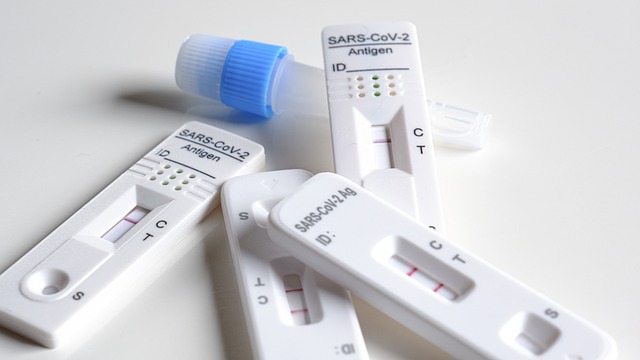Full body blood tests (CMPs) offer a comprehensive health assessment by measuring various components in a single sample, including red/white blood cells, electrolytes, hormones, and inflammation markers. These tests detect early signs of chronic conditions like diabetes, kidney disease, liver disorders, and thyroid problems, aiding healthcare professionals in proactive healthcare management. Regular profiling enables individuals to track treatment effectiveness, monitor nutrition status, make informed health decisions, and maintain optimal well-being. Key components include CBC, CMP, lipid profile, thyroid function assessment, and CRP for a holistic view of overall health.
In today’s world, proactive health monitoring is key. Among the most comprehensive tools at our disposal: full body blood tests. These in-depth assessments offer a panoramic view of your overall health by measuring numerous markers across various physiological systems. By delving into the benefits and understanding the crucial components of these tests, you can empower yourself to make informed decisions about your well-being. This guide explores why regular comprehensive blood profiling is essential for optimal health and how to interpret the results.
- Understanding Full Body Blood Tests: What They Measure and Why They Matter
- Benefits of Regular Comprehensive Blood Profiling for Optimal Health
- Key Components of a Reliable Full Body Blood Panel: Essential Markers to Look For
- Interpreting Results: Navigating the Complexities of Blood Test Outcomes for Informed Decisions
Understanding Full Body Blood Tests: What They Measure and Why They Matter
Full body blood tests, also known as comprehensive metabolic panels (CMPs), offer a wide-ranging overview of your overall health by measuring various components in a single sample of blood. These tests go beyond basic levels of cholesterol and blood sugar to provide insights into key organ functions, electrolyte balance, and nutritional status. By assessing a multitude of markers such as red and white blood cell counts, protein levels, and glucose concentrations, full body blood tests act as a comprehensive health dashboard, enabling healthcare professionals to detect potential issues early on.
The significance of these tests lies in their ability to identify subtle imbalances or anomalies that might not be apparent through conventional checks. They play a crucial role in monitoring chronic conditions like diabetes, kidney disease, liver disorders, and even thyroid problems. Moreover, full body blood tests can help assess the effectiveness of treatments, track nutrition status, and guide decisions regarding lifestyle changes. Regularly incorporating these tests into your healthcare routine empowers you to take an active role in maintaining optimal health.
Benefits of Regular Comprehensive Blood Profiling for Optimal Health
Regular comprehensive blood profiling offers a powerful tool for optimal health monitoring. A Full body blood test provides a detailed snapshot of your overall well-being, allowing healthcare professionals to identify potential health issues at an early stage when they are most treatable. By analysing various components such as red and white blood cells, platelets, electrolytes, hormones, and markers of inflammation, these tests can reveal insights into your body’s function and help detect subtle imbalances that may contribute to chronic diseases down the line.
This proactive approach enables individuals to make informed decisions about their health. Armed with this data, you can tailor lifestyle changes, such as adjusting diet or increasing exercise, to support optimal organ function. Additionally, regular full body blood tests can help track the effectiveness of treatments and monitor progress over time, ensuring that your healthcare strategies are aligned with your unique physiological needs.
Key Components of a Reliable Full Body Blood Panel: Essential Markers to Look For
A comprehensive Full body blood test is a powerful tool for monitoring overall health and identifying potential issues early on. When considering such a panel, look for tests that assess a range of essential markers across various physiological systems. These key components provide a holistic view of your health status.
The most reliable full body blood panel should include measurements of complete blood count (CBC), comprehensive metabolic panel (CMP), lipid profile, thyroid function, and inflammation markers. The CBC offers insights into red and white blood cell counts as well as platelets, crucial for detecting anemia, infections, or inflammatory conditions. The CMP evaluates kidney and liver function, electrolyte balance, and blood sugar levels, providing a snapshot of metabolic health. Lipid profiles measure cholesterol and triglycerides, vital for cardiovascular risk assessment. Thyroid function tests are essential for monitoring metabolism, while inflammation markers, such as C-reactive protein (CRP), help identify underlying inflammatory conditions or infections.
Interpreting Results: Navigating the Complexities of Blood Test Outcomes for Informed Decisions
Interpreting the results of a full body blood test is a crucial step in understanding your overall health. It’s important to remember that each result doesn’t exist in isolation; various factors can influence the readings, such as lifestyle choices, medical history, and even recent activities. Therefore, navigating the complexities of these outcomes requires a holistic perspective.
To make informed decisions based on your test results, consult with healthcare professionals who can help decode the data accurately. They can provide context by comparing your results against established norms and your personal health profile. This collaborative approach ensures that any abnormalities are interpreted correctly, avoiding unnecessary alarm or misconceptions about one’s health status.
Full body blood tests are a comprehensive way to monitor overall health and well-being. By analyzing various markers, these tests provide valuable insights into an individual’s physiological state, enabling proactive healthcare decisions. Regular comprehensive blood profiling is essential for identifying potential health issues early on, allowing for timely interventions. With key components like complete blood count (CBC), metabolic panels, and lipid profiles, a reliable full body blood panel offers a holistic view of one’s health, empowering individuals to take control of their well-being.
